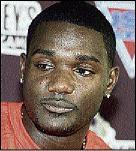
Britain's Dwain Chambers ... failed to rescind a lifetime Olympic ban. - AP
BEIJING (AP):
There's one good way of avoiding a rash of damaging doping scandals at the Olympics: Catch the drug cheats before they get there.
The policy seems to be working ahead of the Beijing Games, with dozens of Olympic athletes from different sports and countries nabbed in recent weeks and months for various doping offences.
The drug busts are the result of a global programme of increased out-of-competition screenings, including targeted testing of suspected dopers, to weed out as many dirty athletes as possible from the 10,000 competitors coming to Beijing for the August 8-24 games.
"Our message has been: 'Leave the cheats at home. Catch them before they leave your shores,"' World Anti-Doping Agency president John Fahey told The Associated Press. "We're seeing the dividends."
An unofficial count by The Associated Press found at least 45 athletes from 11 countries have been ruled out of the Olympics in the last few weeks for drug violations. The list includes athletes in track and filed, swimming, wrestling, weightlifting, boxing, fencing and cycling.
"You'll probably find the number is even higher," WADA director general David Howman said. "Many countries now have realised that the shame that falls upon them from a positive test at the Games themselves is something they want to avoid, so they put their athletes through rigorous testing before they leave."
Intelligence gathering
Surprise out-of-competition controls are considered the most effective way of catching dopers, although many can still slip through the net by evading the system or using undetectable substances.
The International Olympic Committee and WADA have worked with international sports federations to step up the number of pre-Games tests and collaborate on intelligence gathering with law enforcement agencies to go after doping suspects.
"This is not a trend," IOC president Jacques Rogge said. "It's a deliberate policy."
Among the athletes who will miss the Beijing Games because of doping cases: 11 Greek weight-lifters; the entire 11-member Bulgarian weightlifting team; American swimmer Jessica Hardy; Italian fencer Andrea Baldini and cyclist Marta Bastianelli; Danish mountain bike champion Peter Riis Andersen; Chinese race walker Song Hongjuan, swimmer Ouyang Kunpeng and wrestler Luo Meng; Romanian middle distance runners Liliana Popescu, Elena Antoci and Cristina Vasiloiu.
In one of the most dramatic cases of all, seven female Russian track and field athletes - including five Olympians - were suspended by the IAAF last Thursday for allegedly substituting their urine for someone else's to beat doping controls.
The group included, Yelena Soboleva, a world record holder and gold medal favourite in the 800 and 1,500 metres and two-time world 1,500 champion, Tatyana Tomashova.
Some big names have been barred from Beijing for earlier doping offences. American sprinter Justin Gatlin, the 2004 Olympic champion in the 100, lost an appeal to overturn a ban for a second drug violation in 2006. Former European 100 champion Dwain Chambers of Britain, who tested positive for steroids in 2003, failed to rescind a lifetime Olympic ban.
The IOC, meanwhile, is con-sidering banning Greek sprinter Katerina Thanou from Beijing because she eluded drug tests before the 2004 Athens Games and received a two-year suspension.
Howman said the system for catching cheaters is becoming more effective as countries enforce the World Anti-Doping Code, which went into effect four years ago and sets out global rules for testing and sanctions.
No-notice checks

US sprinter Justin Gatlin ... lost an appeal to overturn a ban for a second drug violation. - File
"It's taken quite a while for the countries to put it into practice," he said. "Now it's really kicking into gear in most parts of the world, and that shows how big the problem is."
The official Olympic Games-time testing programme, run by the IOC, began with the opening of the athletes' village July 27.
Competitors are subject to no-notice checks at any time and any place, including training sites in China and abroad.
A total of 4,500 tests will be carried out throughout the Olympic period, up from 3,600 in Athens four years ago.
The programme includes con-trols for the blood-boosting substance EPO and human growth hormone. The top five finishers and two randomly selected athletes in each event will be tested for the usual menu of steroids, stimulants, blood boosters and other per-formance-enhancers.

